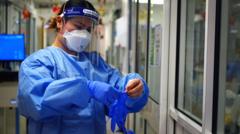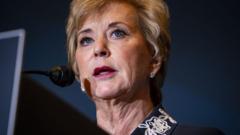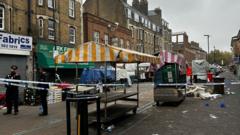
Former Health Secretary Matt Hancock provided testimony at the Covid inquiry, revealing critical insights into the NHS’s challenges during the pandemic. He disclosed that the health service came within “six or seven hours” of running out of protective equipment, though he maintained there was never a “national shortage” of PPE.
Hancock acknowledged that in some locations, healthcare workers did run out of equipment, with some nurses reportedly forced to wear bin bags early in the crisis. He emphasized the need for the NHS to learn from these experiences and establish better stockpiles for future emergencies.
During his testimony, Hancock discussed the immense pressure hospitals faced during the pandemic’s peak. In March 2020, he was “petrified” that lockdown rules might not be stringent enough to prevent overwhelming healthcare systems, drawing comparisons to the situation in northern Italy.
The inquiry explored challenging cases, including that of Suzie Sullivan, a patient with Down’s syndrome who died of Covid in 2020. Medical notes suggested she was not transferred to intensive care due to her pre-existing heart condition. Hancock acknowledged the enormous pressure on the healthcare system, admitting that not every patient could receive intensive care.
He explained that staff ratios were stretched, with specialist critical care nurses sometimes caring for six patients instead of providing one-to-one care. However, he emphasized that the government avoided systematic rationing of care based on patient characteristics.
Regarding pandemic restrictions, Hancock defended the government’s approach. He believed the visiting restrictions, which prevented relatives from being with dying family members and limited ante-natal scan attendance, were “about right” on balance. He acknowledged some issues, particularly with funeral guidance implementation.
Hancock also stood by the “Stay Home, Save Lives, Protect the NHS” messaging, arguing it was “literally true” that stopping virus spread was crucial to preventing NHS overwhelm. He highlighted his efforts to shield the health service from political interference, stating he had to “ruffle some feathers” to protect the NHS from difficulties originating in Number 10.
He noted that political appointees caused “incredible difficulties” in areas like Covid testing rollout. This perspective was partially supported by England’s chief medical officer, Prof Sir Chris Whitty, who suggested that authorities failed to communicate that the NHS remained open for non-Covid patients during the pandemic.
The inquiry hearing was emotionally charged, with Baroness Hallett occasionally interrupting to manage the reactions of bereaved families in the public gallery. Hancock’s testimony spanned two days, focusing on the pandemic’s impact on healthcare systems across the UK.
Throughout his evidence, Hancock maintained that while the pandemic created unprecedented challenges, the government and NHS worked to minimize systemic failures and protect patient care under extreme circumstances.








